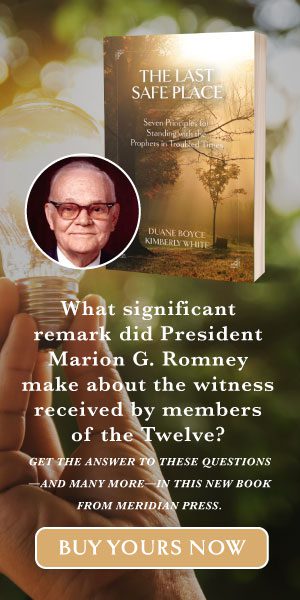
The Last Supper allows us to learn a number of valuable lessons from the Savior and his disciples. This historic meal took place on Thursday, the first day of the feast of the Passover. Tradition suggests that the Last Supper took place in what is now called The Room of the Last Supper, located on Mount Zion, just outside of the walls of Jerusalem.
Lesson #1: At the Last Supper, Jesus Washed the Feed of His Disciples
When the Passover meal had ended and Christ had introduced the Eucharist, or sacrament, Christ washed the feet of his disciples. These were feet protected only by open sandals that had walked the dusty roads from Bethany that morning, and spent additional hours on the unpaved roads of Jerusalem during the day.
Yet Jesus, who knew that the “Father had given all things into his hands,” who knew who he was and where he was going (John 13:3), wrapped himself in a towel, knelt before them, and began to wash those filthy feet.
How would they have reacted? We have a record of the response of Peter, who was not the first to receive this ministration, but no insight into the feelings of the others as this incomparable Man who had raised the dead and healed the sick and confounded the Jewish leaders and declared himself the Redeemer of all mankind, knelt before them with towel and water, and began lovingly to cleanse the grime and dirt from their feet.
We must not miss this outpouring of service as a powerful testimony of his love for these men, and as a lesson for his future followers.
I think all of us can identify with Peter’s exclamation, “Lord, dost thou wash my feet? . . . thou shalt never wash my feet.” (John 13:6,8) Jesus helped Peter understand what he was doing, and continued on with his ministrations.
As he did so, something often overlooked happened.
Lesson #2: At the Last Supper, Jesus Washed the Feed of Judas, who would Betray Him.
The Savior washed Judas’ feet along with the others. Jesus was aware that within a few hours he would brutally, violently die. He knew Judas Iscariot would betray him. And yet he washed his feet, too. This is such a remarkable display of discipline and self-control that it defies any explanation, except the one the Savior gave.
“Know ye what I have done to you? Ye call me Master and Lord: and ye say well; for so I am. If I then, your Lord and Master, have washed your feet; ye ought also to wash one another’s feet. For I have given you an example, that you should do as I have done to you. Verily, verily, I say unto you, the servant is not greater than his lord; neither he that is sent than he that sent him. If ye know these things, happy are ye if ye do them.” (John 13: 13-17)
This is a lesson worth learning!
When Jesus knew in advance that Judas would betray him to his enemies, he washed his feet. Where in all of scripture is a better example of the practice of the following injunction?
“Love your enemies, bless them that curse you, do good to them that hate you, and pray for them which despitefully use you, and persecute you.” (Matthew 5:44)
President Charles W. Penrose, a leader in the Church of Jesus Christ of Latter-day Saints, spoke of our duty in this matter. He said,
“Now, we have no personal warfare against even our enemies. Those who slander and abuse, who try to irritate us to make us respond and retaliate, let them do that and fail. Let them go on with their evil works. Daniel saw in the vision of the last times, that “the wicked should do wickedly, and none of the wicked should understand;” (Daniel 12:10) but the wise shall understand, he says, “and they that turn many unto righteousness shall shine like the stars and like the sun forever and ever.” (Daniel 12:3) Let them go on, therefore, with their evil work. But let us do our work of light and truth and righteousness.” (Charles W. Penrose, Conference Report, October 1906, p.56)
We must be willing to serve others, to love others, and to avoid the pettiness that so often comes with an awareness of our own goodness when compared with the failings of others, or in an unjustified perception of our own importance when compared with the apparent insignificance of others.
In all of our relationships with others, we must “shine like the stars and like the sun.” We must impart light. “Behold,” Christ said, “I am the light which ye shall hold up-that which ye have seen me do.” (3 Nephi 18:24) In John 13, what do we see him do? We see him wash the feet of his friends and his enemy.
Lesson #3: At the last Supper, the Disciples were Willing to Look Into Their Own Lives for Weaknesses
A second lesson worth noting is the response of the Twelve Apostles to the Savior’s announcement that his betrayer was among them. John tells us that following this announcement, “the disciples looked one on another, doubting of whom he spake.” But Matthew mentions something else.
“And they were exceedingly sorrowful, and began every one of them to say unto him, Lord, is it I?” (Matthew 26:22)
This is a lesson worth learning. As we listen to the counsel of scriptures or worthy leaders, or even as we listen to the counsel of our parents and friends, we would do well to ask ourselves this question: “Lord, is it I?”
When we are counseled to reach out to the unfortunate and downtrodden, and to love and fellowship them, we must not say, “I certainly hope my brother is listening to this.”
When messages in the scriptures warn about the dangers of greed, selfishness, and overindulgence, we must not think, “There are a lot of people out there who need to hear this.”
When we are reminded of the need to keep the Sabbath day holy, we must not point an accusing finger at those who fill the stadiums to see the games we are watching on TV.
When church leaders admonish us to forgive others, we must not rejoice that they are finally sending a message to neighbors who need such council. What we must do is ask the Last Supper question: “Lord is it I?”
Lesson #4: At the Last Supper, Jesus Taught “I am the Way, the Truth, and the Life.”
Christ knew what was about to happen to him, and he knew that the Apostles, even after all of the instruction, did not clearly understand. “Let not your heart be troubled,” he said. “Ye believe in God, believe also in me.” (John 13:1)
He had never let them down before, and he would not abandon them now. “I go to prepare a place for you. . . I will come again and receive you unto myself.” (John 13:2,3)
I rejoice in the clarity of the Savior’s answer to Thomas’ concern, “Lord, we know not whither thou goest; and how can we know the way?” (John 14:5) Christ replied, If you know me, you know the way.
“I am the way . . .” (John 14:6)
What a message for a world enveloped in darkness and misdirection. With innumerable millions who do not know the route or the destination, wandering to and fro in darkness, the Savior promises, “I am the way! Come, follow me.”
The way in which we follow is described over and over again in these Last Supper lessons. We find it in John 14:15,21,23,24,31, and John 15:10,14,17-“If ye love me, keep my commandments.”
Lesson #5: At the Last Supper, the Savior Promised to Give His Disciples Peace
In John 14:27, the Savior repeats counsel he gave in John 14:1, “Let not your heart be troubled, neither let it be afraid.”
How can we help but be afraid, Lord? they might have asked him. With you gone, trouble will encompass us constantly. His solution was, “Peace I leave with you, my peace I give unto you . . .”
An apostle of the Church of Jesus Christ of Latter-day Saints spoke of that commandment. He said, “On . . . the night of the greatest suffering the world has ever known or will ever know, he said, Peace I leave with you, my peace I give unto you . . . Let not your heart be troubled, neither let it be afraid.'” (John 14:27)
“I submit to you that may be one of the Savior’s commandments that is, even in the hearts of otherwise faithful [disciples], almost universally disobeyed; and yet I wonder whether our resistance to this invitation could be any more grievous to the Lord’s merciful heart. I can tell you this as a parent. As concerned as I would be if somewhere in their lives one of my children were seriously troubled or unhappy or disobedient, nevertheless, I would be infinitely more devastated if I felt that at such a time that child could not trust me to help, or should feel his or her interests were unimportant to me or unsafe in my care. In that same spirit, I am convinced that none of us can appreciate how deeply it wounds the loving heart of the Savior when he finds that his people do not feel confident in his care or secure in his hands or trust in his commandments.” (Elder Jeffrey R. Holland: CES Satellite Broadcast, 2 March 1997)
Lesson #6: At the Last Supper, Christ Said, “I am the True Vine.”
“I am the true vine,” the Savior declared (John 15:1), and he is. We are branches (John 15:5) who derive our nourishment and support from the strength and goodness of that vine. And we can depend on him, and receive his assistance with all of our needs and troubles. Isaiah spoke of this when he wrote:
“And they shall hang upon him all the glory of his father’s house, the offspring and the issue, all vessels of small quantity, even from the vessels of cups, even to all the vessels of flagons.” (Isaiah 22:24)
Finding Our Own Seat at the Last Supper
We have had sobering glimpses in these chapters of instruction from the Last Supper of lessons that can change our lives: the washing of feet teaches us that we should serve others and love our enemies; the question, “Lord, is it,” teaches us how to respond to counsel; we know the way home because we know Christ, who is the Way. The Lord’s has commanded us to partake of his peace; and he is the vine on which hangs all our hope and happiness.






















Marcel AborMarch 10, 2014
Am grateful for the lessons I have learnt here. Thanks Big !